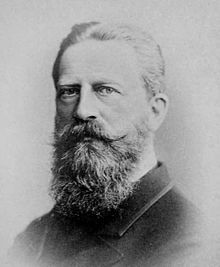China Miéville is a socialist who hates Tolkien. He’s also a little scary looking. His books are worth reading, though, even if you’re a reactionary who loves Tolkien.
I’ve read two of his novels, The City and the City and Embassytown. The former has an intriguing setting (two cities that share the same space, where residents of one have to “unsee” residents of the other) but the plot is a fairly ordinary detective/noir story. Embassytown is more exciting, especially for linguists.
Embassytown is an enclave of mostly human foreigners on a distant planet populated by giant insect-like creatures with two mouths. Their language, which is called Language (!), requires two words to be spoken simultaneously. In addition, the creatures (the Ariekei or “hosts”) are not capable of understanding speech unless it has a mind behind it – so you can program a computer to speak Language to them, but they won’t understand it. Many of them also seem unaware that the noises humans make amongst themselves are a kind of language.
The system humans ultimately developed in order to communicate in Language was to breed identical twins who are kept perfectly in sync. They spend their lives as Ambassadors and go by one name, with half of the name applying to each of them: CalVin, for example, or LuCy. One of them speaks as the top mouth, the other as the lower one.
The native speakers of Language, the Ariekei, also lack the ability to lie. This includes not being able to use similes unless they have literally occurred in the real world: in order for anyone to be able to say, “You look like the cat that ate the canary,” an actual cat would have to have been seen eating an actual canary on at least one occasion. This gets us into the topic of why their language is called merely “Language” — it connects to their thoughts in such a direct, primal way that they don’t have enough distance from it to use it untruthfully, or indeed to call a thing by another name. If you are literally not able to say that the sky is yellow, for example, you probably also lack the capacity to learn another word for blue, like “azul.” If in your childhood you are told “This is a table,” and later in life you begin to call it “ein Tisch,” are you, in some sense, lying? Speaking another language and lying both require you to put some distance between things and the words that refer to them.
Because of the way they experience language, hearing lies is extremely exciting for them. The Ambassadors periodically hold a Festival of Lies where they stand in front of an audience of Ariekei and say whatever manifest untruths come to mind. “The Hosts grew boisterous in a fashion I’d never seen, then to my alarm seemed intoxicated, literally lie-drunk,” says the human narrator (and one-time star of an Ariekene simile that had to be staged so it could be spoken).
The intoxicating effect of lies on the hosts foreshadows the cataclysm that occurs when an unusual ambassador couple with a different kind of mental connection arrives on the planet and begins to speak to them. It is a gripping (and pleasantly disturbing) story with lots of food for thought.
Ursula K. Le Guin called this book “A fully achieved work of art,” and if that’s not enough to recommend it, I don’t know what is.




